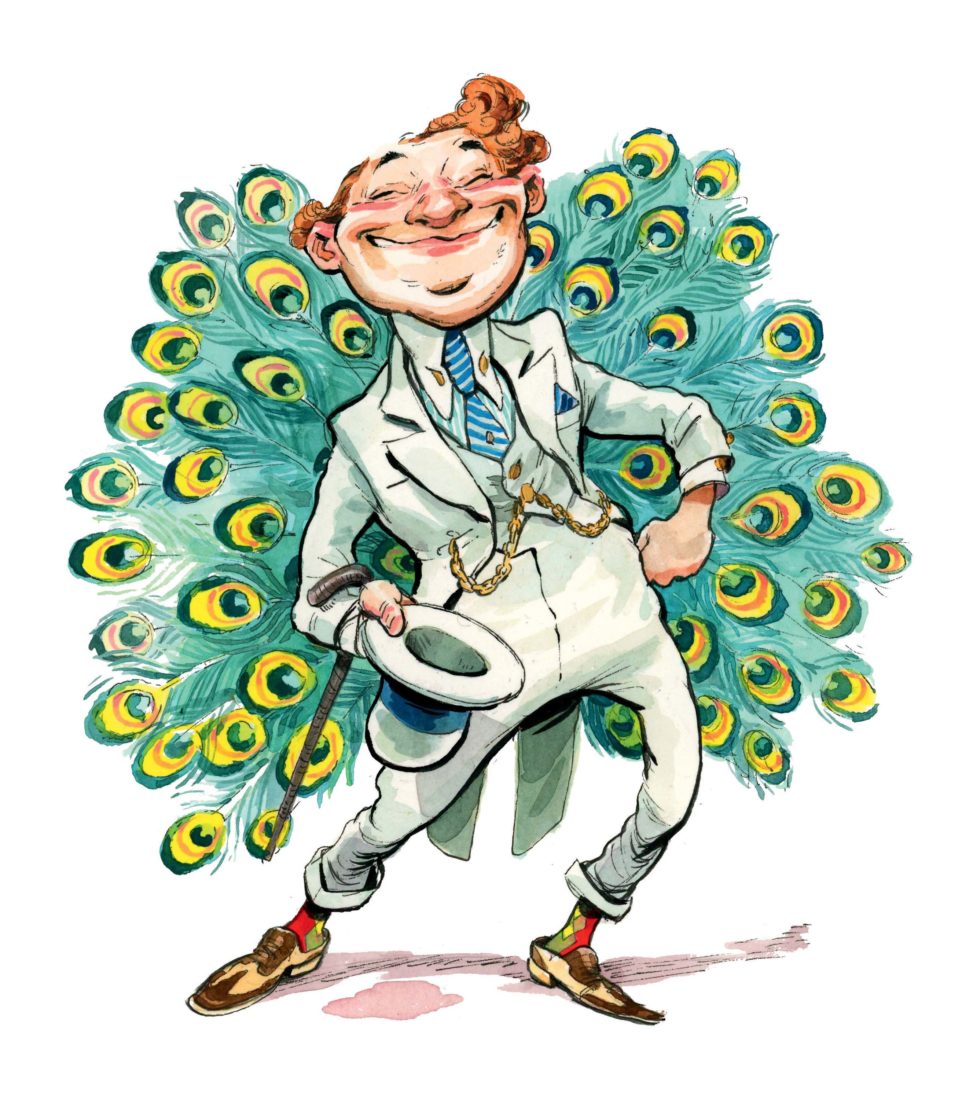Is the Southern dandy extinct, or are some still left on the hoof?
As fashion fauna goes, the South’s peacock is not endangered. Back when dressy spring garden parties for two hundred were possible, one Alabama hostess calculated that more than twenty pairs of double cuffs per hundred men made any event look like “a gamblers’ convention stuck out on a fake riverboat on stilts in the mud south of Memphis.” But it’s a long way from egregious male jewelry to the level of care that a full-time peacock devotes to his plumage, so let’s back up. His biographers estimate that it took the infamous British pretty boy George Bryan “Beau” Brummell five hours to get dressed in the morning, which doubtless contributed to his dying penniless in a French asylum in 1840, even though his rapier wit and high polish had made him the toast of the Court of St. James’s. Ever satirized, nineteenth-century British dandies were also known as “fribbles,” “ninnies,” and, enduringly, “dudes.” The South’s latter-day beaux do serve to set standards for the greater horde of less-kempt males. How would the Friday lunch line at Galatoire’s look without seersucker? Where would the Kentucky Derby be without blazers, boaters, bow ties, or white bucks? However foolish his preening, the Southern peacock brings brightness, energy, and above all, discipline to dress—qualities, I think we can agree, in short supply among men.
Can it be that my neighbor mows too much? He’s out there past dark.
Come spring, it’s difficult to separate a man from his mower. Sadly, it seems as if your neighbor is one of the more seriously afflicted, in the sense that his solution to any circumstance, shockingly including cocktail hour, is to mow. In fairness, he may not yet have become a full-fledged lawn-care zombie, but he’s definitely controlled from within by the intense Southern code mandating that each grassy patch of earth look like a golf course. Now, I’m as reverentially fond of Augusta National’s exquisite fairways as the next Southerner, but whole swaths of the homeland suffer in this way. The malady seems to have sprung from the colonial impulse to “tame” nature, which in the fecund South was productive to the point of strangulation, thus requiring aggressive cutting back. Predictably, the fetish took a dark turn in the twentieth century, with the advent of ever-smaller bits of land ruled by combative entities such as city councils and condo boards madly issuing mowing edicts. The clinical evidence is strong, but we can’t definitively say that all Southerners suffer from mass hysteria that causes them to mow to Amen Corner levels. From the shape of it, your neighbor seems about to drop off the cliff into the zombie abyss. There’s not much you can do. Come Christmas, take him some good whiskey and pray that he’ll snap out of it.
Wouldn’t it make more sense to chop up Texas into five or six states?
As house-proud as we know Texans to be, for your safety, you’ll want to express this heresy more diplomatically when in the Lone Star State. But funny you should ask: There’s an oddly natural logic and an even odder political history to the notion. As a geophysical entity, Texas is flat-out improbable. How could any one colossus reach from the Louisiana swamps to the Chihuahuan Desert? What mezcal were they drinking? Within that ungainly—Texans would say gorgeous—territory, the “states” of Texas suggest themselves. The Hill Country ain’t the Panhandle, the Panhandle isn’t the Gulf Coast, the Coast is nothing like the Big Thicket, and the Big Thicket seems a galaxy away from Big Bend’s vast scrub. As if to prove that somebody should secede to give the mess some shape, Texans have occasionally tried to legislate themselves into state-like pieces, but whenever they got to the chopping block, nobody had the heart to swing the ax. Bottom line: Texas’s variegated giantism is a delight. Want to see some ball cactus? Drive four hundred miles that way. Need to talk to a man about some cattle? Drive three hundred miles the other way. As at its birth from Mexico in 1836, Texas is a nation unto itself. That remains its gift to the South.








